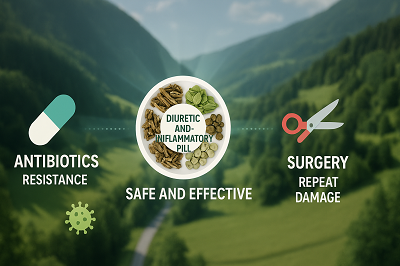Will the Disease Recur After Treatment with Diuretic and Anti-inflammatory Pill?
For men dealing with chronic conditions like prostatitis, urethritis, or epididymitis, one of the biggest concerns is whether the disease will return after treatment. The fear of recurrence can be daunting, especially after enduring symptoms like pain, frequent urination, or discomfort.
Diuretic and Anti-inflammatory Pill, a herbal remedy rooted in Traditional Chinese Medicine (TCM), is designed to address these conditions holistically. But can it prevent recurrence? This article explores the factors behind disease recurrence, how Diuretic and Anti-inflammatory Pill works to reduce relapse risk, and why it stands out compared to antibiotics.

Why Do Diseases Like Prostatitis and Urethritis Recur?
Recurrence of urinary and reproductive system diseases often stems from a combination of factors:
Incomplete Treatment: Antibiotics, commonly prescribed for prostatitis or urethritis, may not fully eliminate bacteria, especially in chronic cases. Residual pathogens can linger, leading to relapse.
Antibiotic Resistance: Overuse of antibiotics can cause bacteria to develop resistance, reducing treatment effectiveness and increasing recurrence rates.
Poor Lifestyle Habits: Factors like irregular diet, excessive alcohol consumption, or inadequate hygiene can weaken the body's defenses, allowing infections to return.
Environmental Triggers: Stress, fatigue, or exposure to damp environments may exacerbate inflammation, contributing to symptom flare-ups.
Studies indicate that chronic prostatitis has a recurrence rate of up to 50% within a year when treated with antibiotics alone, largely due to incomplete bacterial eradication and persistent inflammation [1].
How Diuretic and Anti-inflammatory Pill Reduces Recurrence Risk
Unlike antibiotics, which primarily target bacteria, Diuretic and Anti-inflammatory Pill takes a holistic approach to address both symptoms and underlying causes. Here's how it works:
Comprehensive Pathogen Suppression: The herbal formula contains ingredients like plantain seed and honeysuckle, which have natural antibacterial and anti-inflammatory properties. These components help reduce bacterial load to levels where the body's immune system can manage them effectively.
Improves Internal Environment: The pill promotes blood circulation, clears heat, and removes dampness, creating an environment less conducive to bacterial or viral proliferation. This addresses the root causes of inflammation, reducing the likelihood of relapse [2].
Supports Tissue Repair: By alleviating swelling and promoting healing in affected areas (e.g., prostate, urethra), the pill helps restore normal function, lowering the risk of chronic inflammation [3].
In contrast, antibiotics often fail to address inflammation or tissue damage, and their repeated use can disrupt the body's microbial balance, increasing susceptibility to recurrence. A meta-analysis highlights that TCM formulas can effectively manage chronic prostatitis by targeting multiple pathways, unlike single-target antibiotics [2].
Antibiotics vs. Diuretic and Anti-inflammatory Pill: A Comparison
| Aspect | Antibiotics | Diuretic and Anti-inflammatory Pill |
| Mechanism | Kills bacteria, but may not be 100% effective | Suppresses pathogens, reduces inflammation, improves internal environment |
| Recurrence Risk | Higher due to incomplete bacterial eradication | Lower by addressing root causes and supporting healing |
| Side Effects | May cause digestive issues, antibiotic resistance | Minimal, derived from natural herbs |
| Long-Term Use | Limited by resistance and side effects | Safe for extended use with proper guidance |
While antibiotics can provide quick relief, they often fall short in preventing recurrence, especially in chronic conditions. Diuretic and Anti-inflammatory Pill, by contrast, offers a sustainable approach by strengthening the body's natural defenses.
Lifestyle Habits to Prevent Recurrence
While Diuretic and Anti-inflammatory Pill significantly lowers the risk of recurrence, maintaining good lifestyle habits is crucial for long-term success. Patients are advised to:
Maintain Hygiene: Regular cleaning and avoiding irritants can prevent reinfection.
Adopt a Balanced Diet: Avoid spicy, greasy foods and excessive alcohol, which can trigger inflammation.
Stay Hydrated: Drinking plenty of water supports urinary health and flushes out toxins.
Manage Stress: Chronic stress can weaken immunity, so practices like meditation or moderate exercise can help.
Avoid Prolonged Sitting: For prostatitis patients, frequent movement improves pelvic circulation.
By combining the pill with these habits, patients can create an environment where pathogens struggle to thrive, further reducing relapse risk.
Conclusion
Diuretic and Anti-inflammatory Pill offers a promising solution for men seeking to manage chronic urinary and reproductive conditions with a lower risk of recurrence. While no treatment can guarantee zero relapse, this herbal remedy significantly reduces the likelihood by addressing both symptoms and root causes, unlike antibiotics, which may leave residual issues. By pairing the pill with healthy lifestyle habits, patients can maximize their chances of long-term recovery. For personalized guidance, consult a healthcare provider to tailor the treatment to your needs.
References
1. Xue, Y., et al. (2019). "Traditional Chinese medicine on treating chronic prostatitis/chronic pelvic pain syndrome: A systematic review and meta-analysis." https://pubmed.ncbi.nlm.nih.gov/31261537/
2. Wang, Z., et al. (2016). "Efficacy and safety of Chinese herbal medicine for chronic prostatitis associated with damp-heat and blood-stasis syndromes: a meta-analysis and literature review." https://pubmed.ncbi.nlm.nih.gov/27698555/
3. Liu, J., et al. (2023). "Prostatitis No.1 traditional Chinese medicine significantly exhibited anti-inflammation role on prostatitis through miR-205-5p/YES1." https://pubmed.ncbi.nlm.nih.gov/38279415/



